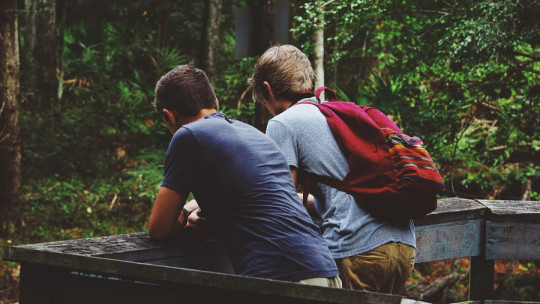
Friends are a very precious commodity, but they are especially more so during what is surely the most turbulent period for most mortals: adolescence.
The friends we have during this period greatly influence our behavior. They influence our way of dressing, speaking, expressing our opinions, and can even lead us to do things that we would not think of under any circumstances being alone.
Friendship in adolescence is a relationship of loyalty and trust, which can bring with it many good and bad things. Let’s look in more detail at why.
Friendship in adolescents
Friends are a fundamental pillar in people’s lives, but they are even more so during adolescence Although it is clear that boys and girls have their first friends already in their earliest childhood, friendship in adolescence becomes an aspect that greatly influences their behavior. Friendship, especially between the ages of 11 and 16, becomes something very intense, something that leaves its mark. Teenagers’ friends leave their mark throughout life, for better and worse.
But why are friends so important during this period? Among their reasons are the physical, psychological and emotional changes that adolescents go through, changes that cause them to leave behind the child they were, very dependent on their parents, and become people who seek their own independent identity. Dad and mom don’t understand them, or at least they think so, and they go to other people who are going through the same thing: other teenagers
Entering a new stage strengthens relationships with friends and creates new ones because the changes they are going through unite them even more. A friend in adolescence is one who is experiencing the same thing as him and, therefore, can better understand his fears, concerns and doubts than an adult would do. What’s more, many teenagers believe that adults will laugh at them if they tell them their fears about the age they are going through, something that other teenagers in principle should not do.
The importance of groups of friends in adolescence
Although each person is different and the way they choose friends in adolescence varies from individual to individual, it should be said that we can find some generic traits depending on age. If we go to early adolescence, which we can place between 11 and 14 years old, (pre)adolescents tend to form small groups, generally of the same sex and with common interests. These friendships are often already established in childhood and their function is more playful
However, as we move deeper and deeper into adolescence, after the age of 14, the groups change. Childhood has already been completely abandoned and individuals are fully aware that they are adolescents and, with it, that they have desires beyond mere fun or looking for someone to spend time with. The groups of friends grow in number and mix with people of the opposite sex Likewise, it should be said that groups of adolescents tend to be quite homogeneous, and friends are chosen based on whether they share certain traits, values, attitudes and similar ideas.
It also happens that from the age of 14 there are more sentimental interests, both towards members of the same sex and the opposite. This is why groups of adolescent friends can become the places where the first relationships arise between their members,
What do teenagers want from their friends?
Adolescents look for a group in their friends that gives them understanding, empathy and that they become people with whom they can talk freely without feeling judged This is directly related to the fact that adolescents go through so many physical, psychological and emotional changes, a process that can overwhelm the individual if he is alone or believes that no one can understand him. Since other teenagers also go through something similar, going to them and having them as friends can become a way to manage these changes.
Friendship in adolescence is a relationship that is based a lot on loyalty, more than at any other time in life. The adolescent seeks to feel accepted and welcomed in a group of equals, and wants to satisfy his or her feeling of belonging ; He trusts practically everything in those people he considers his friends, sharing with them his doubts, concerns and problems. They expect them to understand them, not to fail them or judge them, and to be willing to support them in both good and bad times.
The risks to take into account as parents
At this point it is difficult for us to get an idea of how influential friends can be in adolescence, both for good things and for those that are not so good. Friendship during adolescence is a very influential relationship, so much so that it can influence the way you dress, musical tastes, political interests, opinions on any topic, and behavior in general.
The influence, in itself, does not have to be negative but it does imply certain risks, since The adolescent may feel pressured by his or her peer group to act in a way that he or she would never do if he or she had thought about it alone The reason you behave in a way that goes against your common sense or interests is the fear of isolation and the loneliness of refusing to do what your friends ask you to do.
No teenager wants to be left out or be an outcast for having refused to do something “cool”, and we put that in quotes because not everything they say is going to be cool is really fun and enjoyable. Peer pressure can be used to try new things, have new experiences and learn from them, but it can also mean entering the murky world of drugs, social media exposure and bullying. The adolescent can become an abuser or abused by the decision of her friends, who tell him to attack or allow himself to be attacked.
That is why parents should be aware of who their children hang out with, know what the people they spend so much time with are like, maybe even more than with them. Social networks can be used to carry out massive harassment of innocent people, and they can also be misused, sharing private photographs because a friend of yours has asked you to do so. That is why Educating parents in these aspects is key so that adolescents understand that not everyone is good enough to be their friend, and that they must always put their well-being first instead of caring so much about the acceptance of others.
However, this should not be interpreted as meaning that parents should be responsible for finding friends for their adolescent children. Adolescent children must feel that their parents consider them to be somewhat mature people and to do so they must have the freedom to choose their friends, motivating them to have friends and spend time with them, but respecting the rules and not making serious mistakes. If it turns out that he is dating the wrong person, it is clear that you should intervene, but if that is not the case, you should not get involved.
From all this it is extracted that It is essential that parents know their children’s friends, take an interest in their lives and talk about them respectfully, without giving the impression that they criticize them or consider them unsuitable for their children since this would make the teenager interpret it as an attack on him. That is why we should opt for an approach position, inviting our children’s friends home or meeting their parents.








